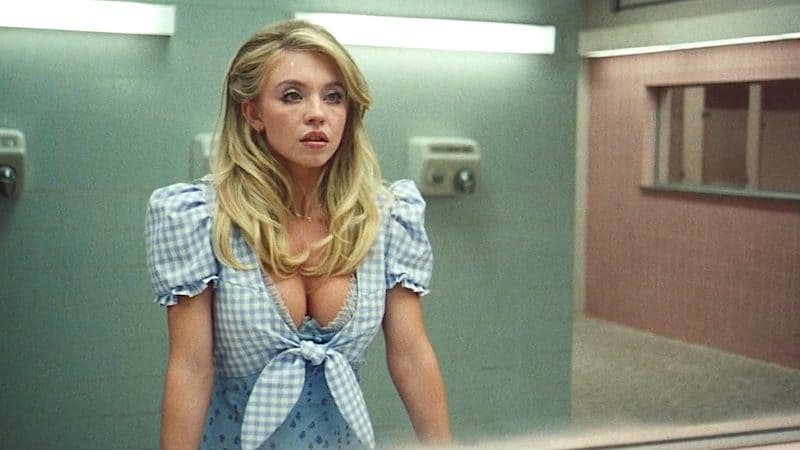The Fantastical Style of ‘Euphoria’ Captures the Realities of Modern Teendom
In its new season, ‘Euphoria’ boosts its stylishness in order to hack into the mind of a teenager.

In the latest episode of Euphoria, Cassie (Sydney Sweeney) has a long-anticipated mini nervous breakdown in her high school bathroom. The cause of her freakout? Her friends think she’s auditioning for a school production of Oklahoma!, based on her frilly light-blue gingham top and cowboy-boot-heel-hybrids that, according to her best friend, Maddy (Alexa Demie), make her look “like a country music star.” Cassie becomes increasingly distressed by the idea that her outfit is the butt of a school-wide joke, until she snaps, tearfully revealing to Maddy that she’s been secretly sleeping with the latters’ ex-boyfriend, Nate (Jacob Elordi).
This is a moment of much-awaited catharsis for Cassie, as the kettle that is her clandestine relationship with Nate has started to whistle sharply and is just about ready to explode with boiling water. The problem? Cassie’s big confession doesn’t actually happen. It’s all in her head. Instead, she merely stares at her reflection in covert shame. And, while it is admittedly a little frustrating that Cassie doesn’t finally speak her mind, the imagined monologue ultimately buttresses one of Euphoria’s primary messages, which is: the best way to depict teendom angst is to turn it into a fantasy.
Indeed, it’s no surprise that Cassie’s long-awaited, lachrymose speech comes precisely at the moment that the group is discussing her sister Lexi’s (Maude Apatow) new play, which is based on the latters’ life. In the first three episodes of Euphoria‘s second season, Cassie has developed an unhealthy attachment to the notoriously cold-blooded and abusive Nate. This obsession manifests chiefly in physical ways for her. Most recently, we see her waking up at four every morning to shave and primp herself to utter perfection to earn Nate’s glance. So when Cassie turns her sister’s play into turf for her own, fictional monologue, it’s hardly surprising, considering the way that she turns her codependence with Nate into a melodramatic performance, instead of quietly suffering and ruminating over it, like someone older than her would most likely do.
This moment speaks to a larger teenage phenomenon. When a teen experiences a splinter in their life, be it rejection from a secret lover, body dysmorphia, or the sinking feeling that they are a spectator of their own life, it can feel like the most monumental event that anyone has ever experienced. Euphoria’s style plays into this feeling of grandiosity, with the extravagant, dreamlike neon fixtures that light up even the local gas station, characters walking down the halls of their high school dressed like they’re attending the Met Gala, and countless flourishing needle-drops per episode. Some argue that Euphoria favors style over substance; I would posit that its style is a great deal of its substance.
The centerpiece of Euphoria is Rue (Zendaya), a high schooler struggling with drug addiction. She narrates her classmates’ lives like she’s an omniscient figure, knowing details about them that they might not even know about themselves. This stylistic choice, which, again, is obvious in its fictitiousness — Rue couldn’t possibly know all of this information — gives extra weight and context to these young characters that might not have existed were we simply given scenes to play out in full. In a sense, this allows each character to become a protagonist in their own right. Notably, the episode “Ruminations: Big and Little Bullys” bends over backward to humanize the most villainous of Euphoria characters, Nate’s father, Cal (Eric Dane), by opening the episode with a 15-minute flashback that shows a teen pregnancy getting in the way of him being with his best friend and potential lover, Derek (Henry Eikenberry).
The episode also offers Rue her own meta moment like Cassie’s. After her little sister, Gia (Storm Reid), asks her if she’s relapsed, Rue moves seamlessly from her kitchen to a classroom, where she is giving a seminar on how to convince your loved ones that you’re not on drugs. This scene carries a lighthearted tone, and, again, it renders our youngster in the spotlight. And for Rue, like Cassie, this spotlight makes sense: her addiction is the most dramatic thing that has ever happened to her; she is an expert; she is, in a sense, in control of the narrative.
And perhaps most surprisingly, Lexi, who has been largely a side character until recently, also has her own scene that plays into Euphoria’s trend of spotlighting and glamorizing its characters’ moments of crisis. In voiceover, Rue explains that, in realizing she often takes the backseat in her own life, Lexi acts as though instead of just living life, she is directing a film about the people around her. This detail manifests in a wacky aside that shows Lexi behind-the-scenes in her directing endeavors. But for Lexi, this is more than just illustrating how it feels to keep herself on the backburner; it also pushes her forcefully into the limelight.
Of course, it’s not exactly groundbreaking to depict teenagers as envisioning themselves in the spotlight, but what Euphoria does that is so fascinating is place characters in the spotlight specifically when they are in the throes of a mental health crisis. And oddly enough, in a show that is home to so many overly stylized and far-fetched elements, depicting moments of teen catastrophe in utter surreality turns out to be one of the most realistic ways you can do it.